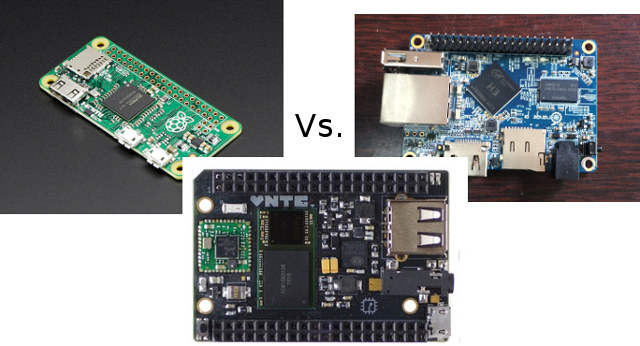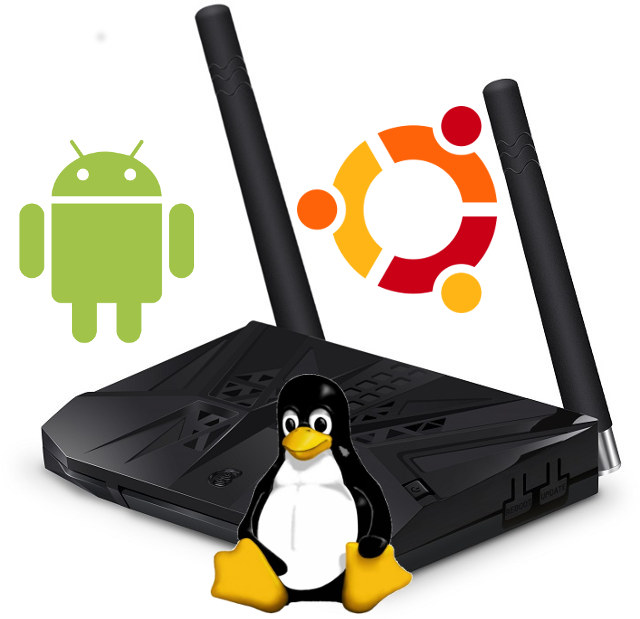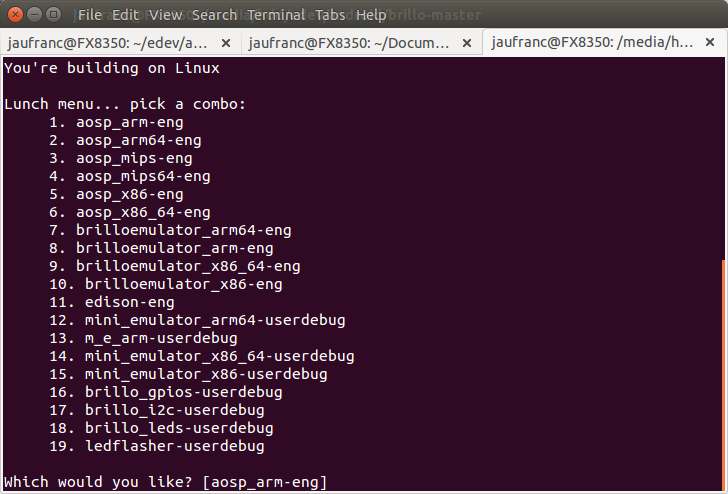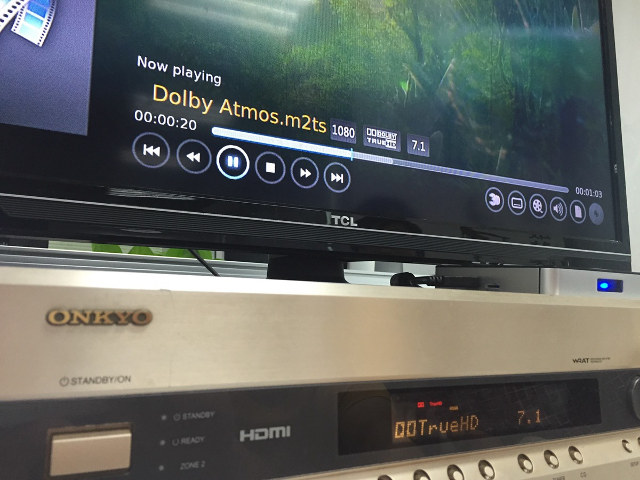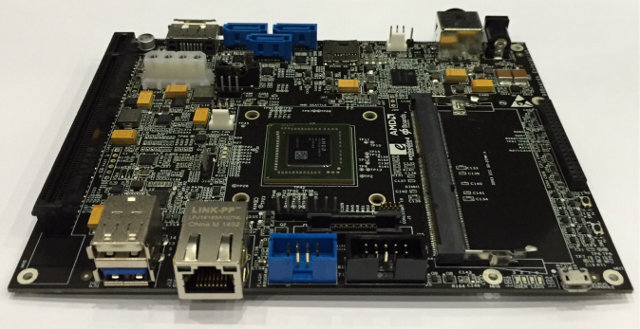Jiayu S3 and S3 Plus are your typical Android smartphones powered by Mediatek MT6752/MT6753 octa core Cortex A53 processor with 3GB RAM, 16GB flash, and a 5.5″ touch screen display. The news here is that Jiayu Germany (a reseller, not the manufacturer), and Team M.A.D (Mediatek Android Developers) comprised of XDA members, have releasing three custom ROMs based on Android 6.0.1 for the smartphone: Cyanogenmod13, Paranoid Android (AOSPA) and AICP (Android Ice Cold Project), which contrast with my Iocean MT6752 smartphone still stuck on Android 4.4.4. I’ll reproduce the technical specifications of Jiayu S3+ phone for reference: SoC- Mediatek MT6753 Octa-core 64-bit ARM Cortex A53 processor @ 1.3 GHz, with ARM Mali-T720 GPU System Memory – 3GB RAM Storage – 16 GB eMMC + micro SD slot up to 64GB Display – 5.5” IPS capacitive touchscreen display; 1920×1080 resolution Connectivity – 802.11 b/g/n/ac Wi-Fi , Bluetooth 4.0, GPS / A-GPS, FM Radio Cellular […]
Raspberry Pi Zero, C.H.I.P, and Orange Pi One Boards’ Features and Price Comparisons
With Raspberry Pi Zero, Next Thing C.H.I.P, and Orange Pi One, we now have have three ARM Linux development boards selling (now or soon) for less than $10 excluding shipping and taxes. So I’d think it would be interesting to compare the features of the boards, and prices for different use cases. The comparison table below shows the three boards features side-by-side with items highlighted in green for the best or extra features, and in red for the weakest. Some cells will have to be filled later as data is currently not available (marked TBD). Raspberry Pi Zero C.H.I.P Orange Pi One Processor Broadcom BCM2835 single core ARM11 processor @ 1GHz (~1250 DMIPS) Allwinner R8 Cortex A8 processor @ 1 GHz (2000 DMIPS) Allwinner H3 quad core Cortex A7 processor @ 1.2 GHz (4x 2280 DMIPS) GPU VideoCore IV ARM Mali-400 ARM Mali-400MP2 Video Decoding 1080p30 for H.264, MPEG2* and […]
Light Biz OS Firmware, Android and Ubuntu Image, and Android SDK Released for GeekBox (RK3368)
GeekBox is an upcoming Android TV box based on Rockchip RK3368 octa-core processor that doubles as a system-on-module and development board. The company has now uploaded the Android 5.1 SDK, including Linux 3.10.79 kernel, on github. It’s not for the Android SDK for RK3368, but at least it’s not just an outdated tarball, and will hopefully be regularly updated directly on github. Beside the source code, the company also released three firmware image including Rockchip’s Light Biz OS desktop operating system based on Lollipop: Biz OS for GeekBox – V151208 (8th of December 2015) Android and Lubuntu dual boot image – V151129 (29th of November 2015) Android 5.1 image – V151129 (29th of November 2015) It’s quite possible those images will also work on other Rockchip RK3368 platform with some modifications, e.g. an updated device tree file for a given hardware. I’ve downloaded Biz OS adn the dual boot image, […]
How to Build Brillo Operating System from Source Code and Run Brillo Emulator
Google formally launched Brillo operating system a few weeks ago. The new operating system is a stripped down version of Android that targets Internet of Things (IoT) applications, and more recently the company pushed the source code to their servers. So I’ve given it a try by checking out the code, building Brillo emulator for Intel/AMD, and running it in Ubuntu 14.04 64-bit. First you’ll need to retrieve the source code:
|
1 2 3 4 |
mkdir brillo-master cd brillo-master repo init -u https://android.googlesource.com/brillo/manifest -b master repo sync -j8 |
It took a few hours here with some errors the first time, so I tried again and I finally got the code a few hours later. Once this is done, set the build environment and configuration:
|
1 |
source build/envsetup.sh && lunch |
Lunch will bring a list of possible builds:
|
1 2 3 4 5 6 7 8 9 10 11 12 13 14 15 16 17 18 19 20 21 22 23 24 |
You're building on Linux Lunch menu... pick a combo: 1. aosp_arm-eng 2. aosp_arm64-eng 3. aosp_mips-eng 4. aosp_mips64-eng 5. aosp_x86-eng 6. aosp_x86_64-eng 7. brilloemulator_arm64-eng 8. brilloemulator_arm-eng 9. brilloemulator_x86_64-eng 10. brilloemulator_x86-eng 11. edison-eng 12. mini_emulator_arm64-userdebug 13. m_e_arm-userdebug 14. mini_emulator_x86_64-userdebug 15. mini_emulator_x86-userdebug 16. brillo_gpios-userdebug 17. brillo_i2c-userdebug 18. brillo_leds-userdebug 19. ledflasher-userdebug Which would you like? [aosp_arm-eng] 9 |
You could also run the “Brillo emulator” on ARM, and edison-eng must be the build for Intel Edison board. Now you can start the build:
|
1 |
make -j8 |
It has to complete 21491 different tasks, […]
Linux Kernel Mainline Status of Mobile SoCs Presentation at Linaro Connect SF015
Linaro Connect San Francisco 2015 is taking place this week, and several 96Boards have been presented including LeMaker Hikey and Qualcomm DragonBoard 410c, both of which will finally be available by the end of the year. But there are also many technical presentation and discussions that are uploaded to LinaroOnAir Youtube account, and they’ve greatly improved video and audio quality compared to the past, with presentation slides also available on Slideshare. I’ve just watched one of the session entitled “Kernel Mainline Status of Mobile Chipsets” by Tim Bird, Sony Mobile. Also the talk focus on mobile SoC, it’s also relevant to other consumer electronics products, and some embedded systems. The presentation states the extend of the issues, shares comparisons between the vendor device tree and mainline, and explains how developers can participate, with the talk ending with a discussion within the group of attendees. Here’s a summary of some of […]
Zidoo Releases Kodi Source Code Modifications for Rockchip RK3368 and Allwinner H3
Kodi is a popular open source media center, but many companies will not simply install the version released on Kodi.org, and instead modify the source code to bring their own improvements. However most companies never release the source as they ought to as per the GPL license used by Kodi. The good news is that Zidoo released their modifications for Rockchip RK3368 and Allwinner H3. Their modifications include support for 3D MVC,7.1 Channel HD Audio pass through, and HW decoding for Rockchip RK3368, and 5.1 audio pass-through, 4K @ 30 fps, and H.265 hardware video decoding for Allwinner H3. You can read the announcement on Kodi forums for RK3368 (Kodi 15.1) and H3 (Kodi 14.2). Kodi 15.1 source code for Rockchip RK3368 can be found on github (make sure to use zidoo-15.1 branch, and not master). In order to build Kodi yourself, you’ll however need the latest version of Rockchip […]
Linux 4.2 Release – Main Changes, ARM and MIPS Architectures
Linus Torvalds released Linux Kernel 4.2 last Sunday: So judging by how little happened this week, it wouldn’t have been a mistake to release 4.2 last week after all, but hey, there’s certainly a few fixes here, and it’s not like delaying 4.2 for a week should have caused any problems either. So here it is, and the merge window for 4.3 is now open. I already have a few pending early pull requests, but as usual I’ll start processing them tomorrow and give the release some time to actually sit. The shortlog from rc8 is tiny, and appended. The patch is pretty tiny too. Go get it, Linus Some notable changes made to Linux 4.2 include: File systems New features for F2FS including per file encryption CIFS support SMB 3.1.1 (experimental) Cryptography – Jitter Entropy Random Number Generator, Chacha20 stream cipher and Poly1305 authentication (RFC7539),New RSA implementation. See lwn.net […]
96Boards Enterprise Edition Specification Published
When AMD announces its 96Boards Enterprise Edition complaint server board, I could read quite a few complains because the board used a non-standard form-factor such as mini-ITX. The first version 96Boards Enterprise Edition specification has now been published, and the goods news is that there are two versions: the low cost ($199 to $399) “Standard version” with the new proprietary format, and likely more expensive “MicroATX version” that must complies with MicroATX v1.2 specs. The minimum hardware requirements are listed as follows: Small form factor Standard EE version – 160 x 120mm microATX EE version – 244 x 244mm Design is SoC independent (targets 32 or 64 bit SoCs) 1GB RAM (16GB strongly recommended for server software development) Minimum on-board connectors and expansion I/O 1x Serial over USB UART with microUSB interface 2x USB 1x RJ45 Ethernet Standard version board power from low cost 12V DC Jack connector or standard […]



